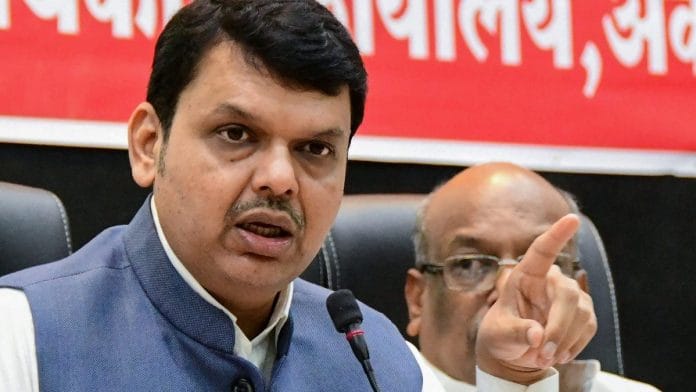Fadnavis’ announcement came after panel tasked with studying social & economic condition of Marathas presented its report to state govt.
Mumbai: Maharashtra chief minister Devendra Fadnavis announced at a rally Thursday that the Marathas should prepare for a “celebration” on 1 December, indicating that his government was set to fulfil a 25-year-old demand of the community for quotas.
Fadnavis’ announcement came soon after the Maharashtra State Backward Class Commission, tasked with studying the social and economic position of the Maratha community in light of the quota demands, presented its report to the state government Thursday morning.
The commission, headed by Justice M.G. Gaikwad (retd), submitted the report to Maharashtra chief secretary D.K. Jain at Mantralaya, the state secretariat.
Addressing a crowd in Ahmednagar, Fadnavis said, “I am happy to declare that the State Backward Class Commission has submitted its report regarding the Maratha quota.
“I had promised earlier that we will do this in a time-bound manner, and that the report will be in by 15 November. Now, before this month ends, we will take all the necessary decisions.”
“Some [Marathas] are planning gheraos and protests over the issue [quotas],” he added, “But what will you have a protest for when the government is taking swift decisions? If anything, prepare for celebrations on 1 December.”
The CM’s statement indicates that the Bharatiya Janata Party (BJP)-led Maharashtra government is planning to complete within this month all the constitutional formalities required to implement a quota for the Maratha community in government jobs and education, and pass a law to this end during the winter session of the state legislature. The winter session will be held between 19 and 30 November.
Also read: In Maratha reservations battle, the struggles of a community to define its caste status
‘Won’t touch existing reservations’
Marathas comprise 32 percent of Maharashtra’s population. Reservations in government education and jobs in the state currently total 52 per cent: 19 per cent for the OBCs, 8 per cent for tribes under the Nomadic Tribes category, 13 per cent for the Scheduled Castes, 7 per cent for the Scheduled Tribes, 3 percent for Vimukt Jatis (denotified tribes), and 2 per cent for special backward classes.
Fadnavis said his government was committed to giving reservation to the Marathas without touching existing quotas.
“From the very first day, the Maratha community has taken a stand the government has backed,” he added. “The Maratha community will get reservations without touching quotas for the Other Backward Classes (OBC).”
Quotas for other reserved categories such as the Scheduled Castes, the Scheduled Tribes, the Nomadic Tribes and so on, he said, won’t be affected either.
Speaking to journalists after the report’s submission, chief secretary Jain said, “We will go through it [the report] and complete the necessary formalities at the earliest.”
Sources said the report will be vetted by the state law and judiciary department and presented to the state cabinet, which is likely to hold a meeting Sunday, a day before the winter session kicks off.
Also read: Maratha protest shows Maharashtra is no better than casteist Bihar or Uttar Pradesh
The demand for a Maratha quota
The Maratha community has been demanding reservations since 1993. The previous government, led by the Congress and the Nationalist Congress Party, had decided to carve out a 16 per cent quota in government jobs and education for the Marathas, but the decision was challenged in the Bombay High Court.
The court put the decision on hold and asked for a study into claims about the community’s social and economic backwardness.
The BJP-led government then tasked the State Backward Class Commission with the study.
The apparent conviction in Fadnavis’ claims Thursday suggests that the report supports the community’s quota demand and endorses its claims of social, economic and educational backwardness.
The Fadnavis government has been facing the community’s ire on the issue since August 2016.
Between August 2016 and 2017, the community held nearly 60 silent marches. Earlier this year, the protests resurfaced, this time in a more violent turn, prompting CM Fadnavis to set a November deadline to resolve the issue.
The protests were initially sparked by the rape and murder of a Maratha girl in Ahmednagar. But the nature of the campaign changed as the protesters began to claim that reservations were in order since the community mostly comprised poor farmers from Marathwada who had suffered due to a deep agrarian crisis and “government neglect”.







That would take quotas upto 68%. Above the apex court mandated ceiling of 50%. It would restrict merit to one third of the total slots available.